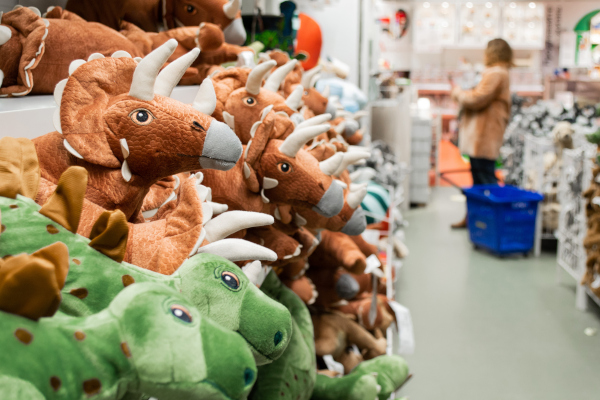Toy Imports Remain Strong Ahead of 2023 Holiday Season
Imports of toys and other Christmas-related items will reach pre-pandemic levels
Despite shaky economic conditions heading into the new year, the 2023 holiday retail season is shaping up to be jolly.
The National Retail Federation expects holiday spending to reach record levels during November and December, growing between 3% and 4% over 2022 to between $957.3 billion and $966.6 billion. A slower growth rate compared with the past three years, when trillions of dollars of stimulus led to unprecedented rates of retail spending, but consistent with the average annual holiday increase of 3.6% from 2010 to 2019.
Strong imports of toys and Christmas-related goods support this prediction, reaching similar pre-pandemic levels. While toy imports are down nearly 30% year-to-date, they are at the same level as 2019, according to data presented by Jason Miller, supply chain professor at Michigan State University. This data shows metric tons of containerized waterborne imports from the world to the U.S. for the first 9 months of each year back to 2003.
“This suggests importers are still expecting strong spending on toys this holiday season,” he said.
Miller also noted that “these strong imports have occurred during a time where retailers and wholesalers have broadly been moving to right-size inventories after accumulating excessive stocks in the first half of 2022.”
The National Retail Federation expects holiday spending to reach record levels during November and December, growing between 3% and 4% over 2022 to between $957.3 billion and $966.6 billion.
Imports of Christmas-related merchandise are also promising this year, reaching the second-highest level since 2003 in terms of metric tonnage.
These numbers are great news for a retail industry that has been threatened by economic headwinds, such as high interest rates, inflation, and a less-than-stellar housing market. Despite these pressures, it appears retail will not yet repeat the hardships of the 2008 holiday season.
“It should be emphasized just how much imports of both of these product categories plunged in 2008 and 2009 during the global financial crisis,” said Miller. “This makes perfect sense because we saw a sharp decline in retail sales over this period. Clearly, this year is different, and maybe another sign that importers aren’t seeing signs of a dramatic slowdown in consumer spending materializing.”
And while it appears retailers’ spirits are high, the predicted demand from consumers can still be easily impacted before year’s end.
“Consumers remain in the driver’s seat, and are resilient despite headwinds of inflation, higher gas prices, stringent credit conditions, and elevated interest rates,” said NRF Chief Economist Jack Kleinhenz. “We expect spending to continue through the end of the year on a range of items and experiences, but at a slower pace. Solid job and wage growth will be contributing factors this holiday season, and consumers will be looking for deals and discounts to stretch their dollars.”
Article Topics
University of Michigan Ross School of Business News & Resources
Toy Imports Remain Strong Ahead of 2023 Holiday Season University of Michigan Ross School of Business - What is Leadership?Latest in Supply Chain
Trucking Industry Pushes Back on Government’s Electric Mandates Senators Take Aim at Amazon with Warehouse Worker Protection Act Maersk Sees Silver Lining in Red Sea Shipping Challenges Happy Returns Partners With Shein and Forever 21 to Simplify Returns Baltimore Opens 45-Foot Deep Channel Following Bridge Collapse El Paso Border Delays Cost Juarez $32 Million Per Day in Economic Losses Ranking the World’s 10 Biggest Supply Chains More Supply ChainAbout the Author














